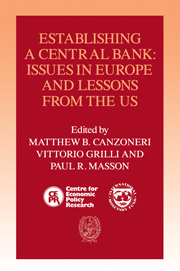Book contents
- Frontmatter
- Contents
- List of figures
- List of tables
- Preface
- List of conference participants
- 1 Introduction
- PART I THE DESIGN OF A CENTRAL BANK
- PART II TRANSITION FROM NATIONAL CENTRAL BANKS TO A EUROPEAN CENTRAL BANK
- PART III FISCAL POLICY REQUIREMENTS OF A COMMON CURRENCY AREA
- 7 Fiscal federalism and optimum currency areas: evidence for Europe from the United States
- 8 Market-based fiscal discipline in monetary unions: evidence from the US municipal bond market
- PART IV GLOBAL IMPLICATIONS OF A EUROPEAN CENTRAL BANK
- Index
7 - Fiscal federalism and optimum currency areas: evidence for Europe from the United States
Published online by Cambridge University Press: 05 March 2012
- Frontmatter
- Contents
- List of figures
- List of tables
- Preface
- List of conference participants
- 1 Introduction
- PART I THE DESIGN OF A CENTRAL BANK
- PART II TRANSITION FROM NATIONAL CENTRAL BANKS TO A EUROPEAN CENTRAL BANK
- PART III FISCAL POLICY REQUIREMENTS OF A COMMON CURRENCY AREA
- 7 Fiscal federalism and optimum currency areas: evidence for Europe from the United States
- 8 Market-based fiscal discipline in monetary unions: evidence from the US municipal bond market
- PART IV GLOBAL IMPLICATIONS OF A EUROPEAN CENTRAL BANK
- Index
Summary
Introduction
Some background
The issue of the appropriate exchange rate (ER) system for Europe is now hotly debated. Yet the question of whether Europe should have a single currency is not new. It goes back to the very first debates surrounding European economic integration of the late 1940s and the 1950s. From the very beginning people have asked what, in our opinion, is a central question: why do ER problems seem not to exist within some subsets of countries or within a country with a diversity of regions (as, for instance, the United States), while they do exist in the world as a whole? Put differently, why has the ‘irrevocably fixed’ ER system within the US functioned well, while the Gold Standard and the Bretton Woods systems collapsed? Economists have phrased this question in the following way: what constitutes an optimum (or at least reasonably good) currency area?
Different schools have answered this question differently. Classical economists argued that the key variable to exchange rate regimes is transactions costs. Because these transactions costs represent social losses, they should be minimized and the way to do it is to have a single worldwide currency. Thus the entire world is an optimum currency area. J. S. Mill puts it in a very illustrative way:
‘…So much of barbarism, however, still remains in the transactions of most civilized nations, that almost all independent countries choose to assert their nationality by having, to their own inconvenience and that of their neighbors, a peculiar currency of their own.’
- Type
- Chapter
- Information
- Establishing a Central BankIssues in Europe and Lessons from the U.S., pp. 195 - 227Publisher: Cambridge University PressPrint publication year: 1992
- 82
- Cited by



